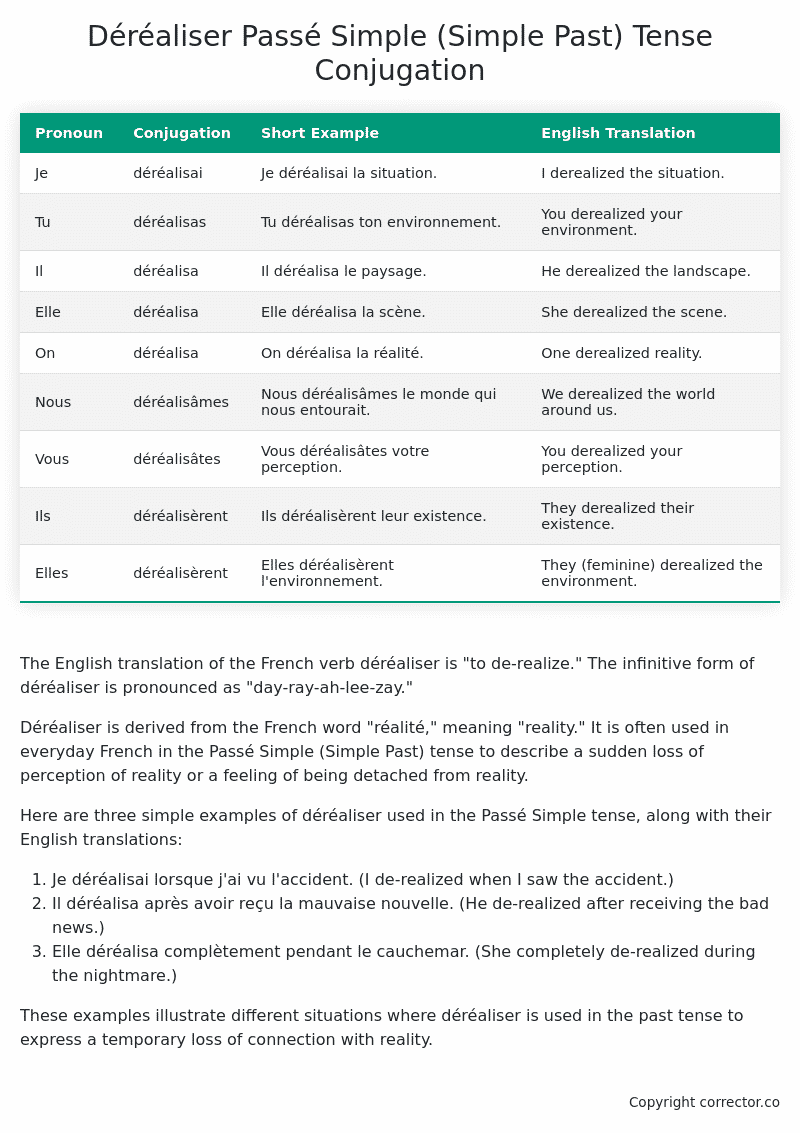Passé Simple (Simple Past) Tense Conjugation of the French Verb déréaliser
Introduction to the verb déréaliser
The English translation of the French verb déréaliser is “to de-realize.” The infinitive form of déréaliser is pronounced as “day-ray-ah-lee-zay.”
Déréaliser is derived from the French word “réalité,” meaning “reality.” It is often used in everyday French in the Passé Simple (Simple Past) tense to describe a sudden loss of perception of reality or a feeling of being detached from reality.
Here are three simple examples of déréaliser used in the Passé Simple tense, along with their English translations:
- Je déréalisai lorsque j’ai vu l’accident.
(I de-realized when I saw the accident.) - Il déréalisa après avoir reçu la mauvaise nouvelle.
(He de-realized after receiving the bad news.) - Elle déréalisa complètement pendant le cauchemar.
(She completely de-realized during the nightmare.)
These examples illustrate different situations where déréaliser is used in the past tense to express a temporary loss of connection with reality.
Table of the Passé Simple (Simple Past) Tense Conjugation of déréaliser
| Pronoun | Conjugation | Short Example | English Translation |
|---|---|---|---|
| Je | déréalisai | Je déréalisai la situation. | I derealized the situation. |
| Tu | déréalisas | Tu déréalisas ton environnement. | You derealized your environment. |
| Il | déréalisa | Il déréalisa le paysage. | He derealized the landscape. |
| Elle | déréalisa | Elle déréalisa la scène. | She derealized the scene. |
| On | déréalisa | On déréalisa la réalité. | One derealized reality. |
| Nous | déréalisâmes | Nous déréalisâmes le monde qui nous entourait. | We derealized the world around us. |
| Vous | déréalisâtes | Vous déréalisâtes votre perception. | You derealized your perception. |
| Ils | déréalisèrent | Ils déréalisèrent leur existence. | They derealized their existence. |
| Elles | déréalisèrent | Elles déréalisèrent l’environnement. | They (feminine) derealized the environment. |
Other Conjugations for Déréaliser.
Le Present (Present Tense) Conjugation of the French Verb déréaliser
Imparfait (Imperfect) Tense Conjugation of the French Verb déréaliser
Passé Simple (Simple Past) Tense Conjugation of the French Verb déréaliser (You’re reading it right now!)
Passé Composé (Present Perfect) Tense Conjugation of the French Verb déréaliser
Futur Simple (Simple Future) Tense Conjugation of the French Verb déréaliser
Futur Proche (Near Future) Tense Conjugation of the French Verb déréaliser
Plus-que-parfait (Pluperfect) Tense Conjugation of the French Verb déréaliser
Passé Antérieur (Past Anterior) Tense Conjugation of the French Verb déréaliser
Futur Antérieur (Future Anterior) Tense Conjugation of the French Verb déréaliser
Subjonctif Présent (Subjunctive Present) Tense Conjugation of the French Verb déréaliser
Subjonctif Passé (Subjunctive Past) Tense Conjugation of the French Verb déréaliser
Subjonctif Imparfait (Subjunctive Imperfect) Tense Conjugation of the French Verb déréaliser
Subjonctif Plus-que-parfait (Subjunctive Pluperfect) Tense Conjugation of the French Verb déréaliser
Conditionnel Présent (Conditional Present) Tense Conjugation of the French Verb déréaliser
Conditionnel Passé (Conditional Past) Tense Conjugation of the French Verb déréaliser
Conditionnel Passé II (Conditional Past II) Tense Conjugation of the French Verb déréaliser
L’impératif Présent (Imperative Present) Tense Conjugation of the French Verb déréaliser
L’impératif Passé (Imperative Past) Tense Conjugation of the French Verb déréaliser
L’infinitif Présent (Infinitive Present) Tense Conjugation of the French Verb déréaliser
L’infinitif Passé (Infinitive Past) Tense Conjugation of the French Verb déréaliser
Le Participe Présent (Present Participle) Tense Conjugation of the French Verb déréaliser
Le Participe Passé (Past Participle) Tense Conjugation of the French Verb déréaliser
Struggling with French verbs or the language in general? Why not use our free French Grammar Checker – no registration required!
Get a FREE Download Study Sheet of this Conjugation 🔥
Simply right click the image below, click “save image” and get your free reference for the déréaliser Passé Simple tense conjugation!

Déréaliser – About the French Passé Simple (Simple Past) Tense
Formation
Usage
Narration
Historical Context
Interactions with other tenses
Passé Composé
Imparfait
Conditional and Subjunctive
Summary
I hope you enjoyed this article on the verb déréaliser. Still in a learning mood? Check out another TOTALLY random French verb conjugation!


